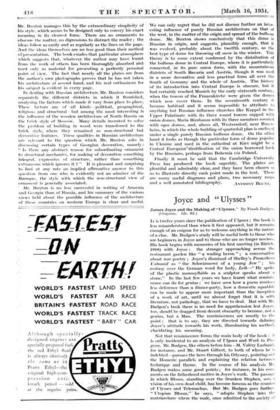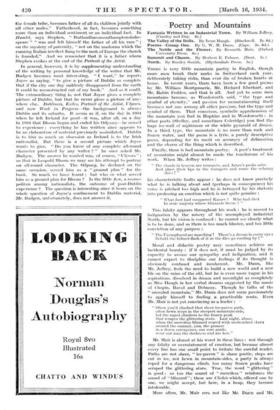Joyce and " Ulysses "
James Joyce and the Making of “Ulysses." By Frank Budgen. (Grayson. 12s. 6d.) James Joyce and the Making of “Ulysses." By Frank Budgen. (Grayson. 12s. 6d.)
IT is twelve years since the publication of Ulysses ; the book is less misunderstood than when it first appeared, but it remains enough of an enigma for us to welcome anything in the nature of a clue. Mr. Budgen's study will be useful both to those Who are beginners in Joyce and to those who are no longer novices. His book begins with memories Of his first meeting (in Zurich, 1918) with Joyce : the stranger approaching across the restaurant garden like " a wading heron " ; a conversation about war poetry ; Joyce's dismissal of Shelley's Prometheus Unbound as " the Schwarmerei of a young Jew " ; his ecstasy over the German word for body, Leib—" He spoke of the plastic monosyllable as a sculptor speaks about a stone." In the last few years we have learnt what reminis- cence can do for genius ; we have seen how a poem receives less deference than a dinner-party, how a domestic squabble can he made to appear more important than the inception of a work of art, until we almost forget that it is with literature, not pathology, that we have to deal. But with Mr. Budgen's book there is no need for apprehension lest Joyce, too, should be dragged from decent obscurity to become, nofa genius, but a Man. - The reminiscences are mostly to the point ; that is to say, they are directed towards defining Joyce's attitude towards his work, illuminating his method, elucidating his meaning.
Not that reminiscence forms the main body of the book it is only incidental to an analysis of Ulysses and Work in Pro- gress. Mr. Budgen, like others before him—M. Valery Larbatl. for instance, and Mr. Stuart Gilbert, to both of whom he is indebted—pursues the hero through his Odyssey, pointing out the Homeric parallels and explaining the relation between technique and theme. In the course of his analysis Mr. Budgen 'makes some gdod points ; for instance, in his com- ments on the fatherhood motive in Joyce's work. The passage in which Bloom, standing over the drunken Stephen, sees a vision of his own dead child, has become famous as the reunion -of- Ulysses-and Telemachus. -But_ Mr. -Budgen goes further.
" Utopian - Ate " adoptw -Stephen into OP matriarchate where the male, once admitted to the society of the female tribe, becomes father of all its children jointly with all other males." Fatherhood, in fact, becomes something more than an individual sentiment or an individual fact. In Hamlet, says Stephen, " Rutlandbaconsouthamptonshake- speare " " was and felt himself the father of all his race " ; on the mystery of paternity, " not on the madonna which the cunning Italian intellect flung to the mob of Europe the church is founded." And we remember that it is a father whom Stephen evokes at the end of the Portrait of the Artist.
In general, however, it is by supplementing understanding of the writing by personal knowledge of the writer that Mr. Budgen becomes most interesting. " I want," he reports Joyce as saying, " to give a picture of Dublin so complete that if the city one day suddenly disappeared from the earth it could be reconstructed out of my book." And so it could. The extraordinary thing is, not that Joyce gives a complete picture of Dublin, but that he never gives a picture of any- where else. Dubliners, Exiles, Portrait of the Artist, Ulysses, and now Work in Progress—the background is always Dublin and its suburbs. It seems as if, on the day in 1904 when he left Ireland for good—it was, after all, on a day in 1904 that Bloom began and ended his Odyssey—he ceased to experience ; everything lie has written since appears to be an elaboration of material previously assimilated. Dublin is to him as much an obsession as Ireland is to the Irish nationalist. But there is a second picture which Joyce wants to give. " Do you know of any complete all-round character presented by any writer ? " he once asked Mr. Budgen. The answer he wanted was, of course, "Ulysses" ; so that in Leopold Bloom we may see his attempt to portray an all-round character. The Odyssey, he declared on the same occasion, served him as a " ground plan " for the book. So much we have learnt ; but who or what served him as a ground plan for Bloom ? Is the little Jew, a cosmo- politan among nationalists, the outcome of post-Dublin experience ? The question is interesting since it bears on the whole question of Joyce's confinement to Dublin material. Mr. Budgen, unfortunately, does not answer it.











































 Previous page
Previous page